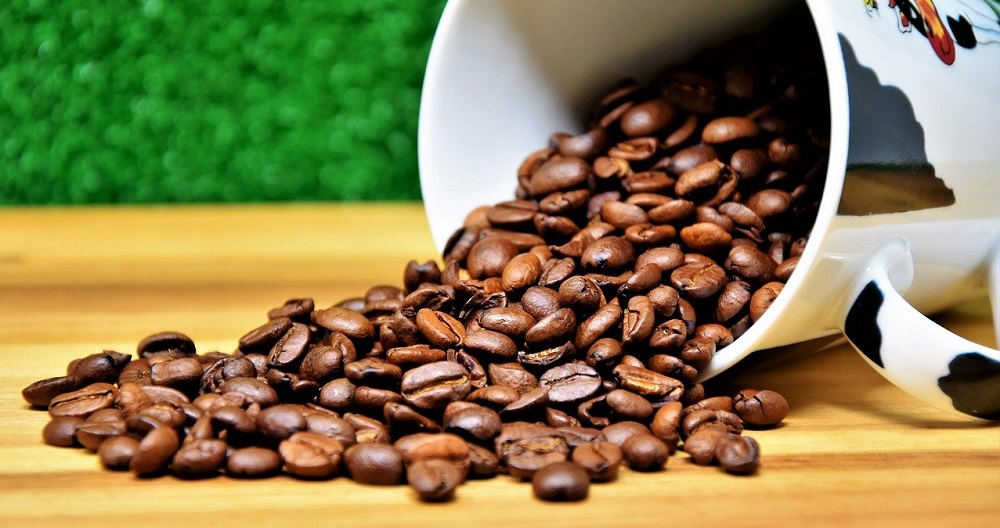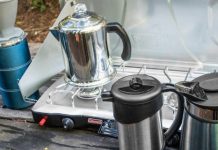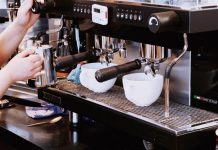The perfect shot of espresso not only requires the perfect equipment and the perfect brewing technique, but it also relies on the perfect coffee beans. Now that we think about it, the beans might be the most important part of the espresso brewing process. Choose the wrong type of bean and your espresso will fall flat on its face. That’s why we’ve decided to do some extensive research and experimentation to find the best espresso beans available. Beans that make the perfect cup of espresso and have plenty of flavors. And we’re confident that the ones we’ve selected will serve all of our readers well.
Quick Summary of the Best Espresso Beans
- Editor’s Choice: Starbucks Espresso Dark Roast Beans (Amazon) – Review
- Also Recommended: Eight O’ Clock Dark Italian Espresso Beans (Amazon) – Review
- Also Consider: Lavazza Gran Espresso Medium Roast Beans (Amazon) – Review
Editor’s Choice: Starbucks Espresso Dark Roast Beans
No one can say that Starbucks doesn’t make quality products. We don’t think that we’ve run across a single coffee product of theirs that we didn’t like in some way. And this product isn’t an exception to that fact. This dark roasted product is designed to make a great espresso, and in that regards it lives up to its ideal quite well. It’s the type of coffee bean that we wish more coffee shops would use to craft the perfect shot of espresso.
One of the first things that we’d like to mention about these whole beans is that they’ve been dark roasted, and when we mean darkly roasted, we mean roasted almost to they’re burnt. Although we don’t have a problem with this level of roasting, particularly since we feel it adds a smokiness to the end product, we think that some people might consider it to be a bit too dark. Each person is going to have to make up their mind about it to determine if this is the best espresso beans for their needs.
The dark roasted beans have an intense, bold, and sweet flavor profile that we think goes very well with steamed milk and/or heavy creamers. In our opinion, it makes an exceptionally bold shot of espresso, and we’re not sure why more people don’t prefer these beans for making espresso. This is 100% Arabica coffee that has a slight tang to it and a pronounced smokiness to it. For coffee drinkers who like those qualities out of their coffee, this may be the perfect beans.
Also Recommended: Eight O’ Clock Dark Italian Espresso Beans
For some people, Eight O’Clock was a brand that produced a nice and inexpensive coffee contained in a metal container. We know that many of our grandparents and parents loved this brand of coffee and many of us are still using the old metal tins they used to use for coin banks. But we’d like to state that this coffee brand just isn’t a brand from the past. No, they’re currently making some of the best espresso beans available—coffee beans that we took the time to review.
Let us begin by saying that although this coffee isn’t as bold as some of the coffees we’ve used to make espresso, it still has a great flavor for people who are looking for something with a little bit of depth. These beans produce a coffee that has an ever so subtle flavor that has hints of caramel mingling with chocolate, and it has a body that’s full and is never bitter. Although we’ve tried a variety of dark-roasted beans this one probably has to be the one that’s the least acidic as well.
Eight O’Clock has been producing quality coffees since 1859 and their expertise shows in these beans. They use 100% Arabica beans that are perfectly dark-roasted, Kosher certified, and then packed into sealed bags that hold in the freshness. And speaking of freshness, this company must ship them as soon as they roast them because after trying several bags of this product, we couldn’t find one bag of it that was stale. We have to conclude this review by stating that we loved these beans and think they make a nice, if understated, shot of espresso.
Also Consider: Lavazza Gran Espresso Medium Roast Beans
For some espresso purists, no other coffee beans than Lavazza Gran Italian Roast Espresso Beans would fit the bill. We knew that many people felt that way about these espresso beans, so we knew that we had to take a moment to see if we should include it on our list of the best beans for espresso. We didn’t know a lot about this coffee, other than it’s been around since 1895, so we came to it with very few biases. And what we discovered is that much of the hype surrounding these beans is warranted.
These beans are medium-roasted and when brewed, they have a nice body and aroma. They also have a balanced and rich flavor that has undertones of cocoa that have been spiked with just a touch of freshly cracked black pepper. These coffee beans are a mix of Arabica beans sourced from Brazil and Honduras and mixed with Robusta beans sourced from Uganda. The resulting combination is extremely well balanced and a bit spicy. And because these beans are blended and expertly roasted in Italy, they are perfect for an espresso machine.
If there was any complaint we had about this coffee, it was that it was a little bit more expensive than some of the other espresso beans we’ve reviewed. It’s not prohibitively expensive, however, and we feel that many people aren’t going to mind spending a little bit of extra money for a true espresso experience. When properly ground and used in a genuine espresso machine, these coffee beans are the ones that are the most likely to provide the coffee drinker with a taste of real Italian espresso.
An Espresso Lover’s Guide To Coffee Beans
Now that we’ve gone over some of the best espresso beans available, we wanted to do a deeper dive into this subject. We wanted to give all of our readers the information they need to craft the perfect single or double shot of espresso. With that lofty goal in mind, we created this guide. A guide that we hope will help the reader come closer to a true espresso experience, so let’s get started.
[wc_fa icon=”cutlery” margin_left=”” margin_right=”10″ class=””][/wc_fa]Finding The Perfect Espresso Beans
The first step to crafting the best espresso is to find the perfect espresso beans. And when it comes to coffee beans that are suitable for making espressos, the coffee drinker has a lot of options available to them. And the beans that the consumer should choose depends on how they like their espresso and how they make it. With that in mind, below are some tips for sourcing the perfect beans for your next cup of espresso.
[wc_fa icon=”spoon” margin_left=”” margin_right=”10″ class=””][/wc_fa]Step One: Arabica Or Robusta Coffee Beans?
The decision to choose between Arabica and Robusta beans can be complicated. That’s because although Arabica beans are technically the higher quality beans than Robusta, that doesn’t mean that Robusta beans don’t add something to the conversation. Even though some coffee purists will state that espresso has to be made with nothing but Arabica beans, we beg to differ. Several coffee brands make exceptional espressos and don’t use 100% Arabica. Just thinking about the products we’ve reviewed, Lavazza is a brand that’s highly regarded when it comes to brewing home espresso, yet it’s a combination of Arabica and Robusta beans.
Robusta beans usually cost less than single-sourced Arabica beans, which is why some company makers mix them into their blends. Robusta beans tend to have a blunter taste to them than Arabica beans and are usually less acidic and sweet. It’s this flavor profile that makes many people think it’s an inferior coffee bean, and for certain types of coffees that might well be the case. But when Robusta beans are used in an espresso machine, they produce more crema–and anyone who knows espresso knows that crema is like manna from the gods.
In our experience, the consumer is probably going to want to either go with 100% Arabica beans to make their espresso or if they want an enhanced crema, then they should go with an Arabica/Robusta blend like what Lavazza produces. It’s really up to the consumer and the quality of the equipment they’re using. As we stated, it’s complicated. However, let’s simplify it a little bit. In our opinion, if the consumer is using a high-end espresso machine then they should use an Arabica/Robusta blend. If not, then they should go with 100% Arabica beans.
[wc_fa icon=”spoon” margin_left=”” margin_right=”10″ class=””][/wc_fa]Step Two: Choosing The Right Coffee Roast
Another thing that the espresso lover is going to want to keep in mind is the roast of the coffee beans they’re thinking about buying. As a general rule, espresso beans are roasted darker than the beans for drip coffee. Usually, the best drip coffees are medium-roasted, and for espresso, the consumer is probably going to want to go with a medium-dark or darker roast.
How can a person decide if they need a medium-dark or a dark-roasted coffee? Well, they can think about what type of coffee drink they’re thinking of enjoying. If they’re just enjoying a shot of espresso straight up, then they might want to choose a medium-dark roast. On the other hand, if they’re going to use it in a milk-based coffee drink such as a latte or a cappuccino, then they might want to go with a darker roast because it will shine through the dairy products better than a lighter roasted coffee.
[wc_fa icon=”cutlery” margin_left=”” margin_right=”10″ class=””][/wc_fa]Making The Best Shot Of Espresso
Okay, now that we’ve not only listed the best espresso beans currently available, as well as some sage advice on choosing coffee beans for your next shot of espresso, but we also want to talk about how to turn those beans into a great espresso. Below are some tips that consumers should think about before brewing their next cup of espresso to ensure that it’s as good as possible.
[wc_fa icon=”spoon” margin_left=”” margin_right=”10″ class=””][/wc_fa]Use The Best Coffee Beans Possible
Since we’ve already covered this, we’re not going to spend a lot of time talking about the coffee beans. All we’ll say is that the consumer should buy whole beans and not use ground coffee. Period, end of the story.
[wc_fa icon=”spoon” margin_left=”” margin_right=”10″ class=””][/wc_fa]Grind The Beans Before Brewing
The beans should never ever be ground days before brewing. That’s just a terrible way to do it. The whole beans should be ground right before they’re added to the espresso machine. And we do mean, right before. That will ensure that the beans are fresh and will result in a more flavorful espresso.
[wc_fa icon=”spoon” margin_left=”” margin_right=”10″ class=””][/wc_fa]Use Filtered Water
No one should use tap water to make espresso. That’s because tap water not only has impurities that can ruin the flavor profile of the coffee but it also usually has chlorine in it. Now, don’t get us wrong, we understand chlorine is necessary to keep microorganisms from growing in the water and it helps to keep the water potable, but it also makes espresso taste horrible. Therefore, the consumer should do themselves a favor and use freshly filtered water for making their espresso.
[wc_fa icon=”spoon” margin_left=”” margin_right=”10″ class=””][/wc_fa]Keep The Espresso Machine Clean
The final piece of advice we would like to give to our readers is for them to keep their espresso machine clean. Not only do dirty espresso machines impart a bitter taste to the end product, but espresso machines don’t work as well when they’re dirty. For the best espresso coffee, the consumer should keep their machine as clean as possible.






















